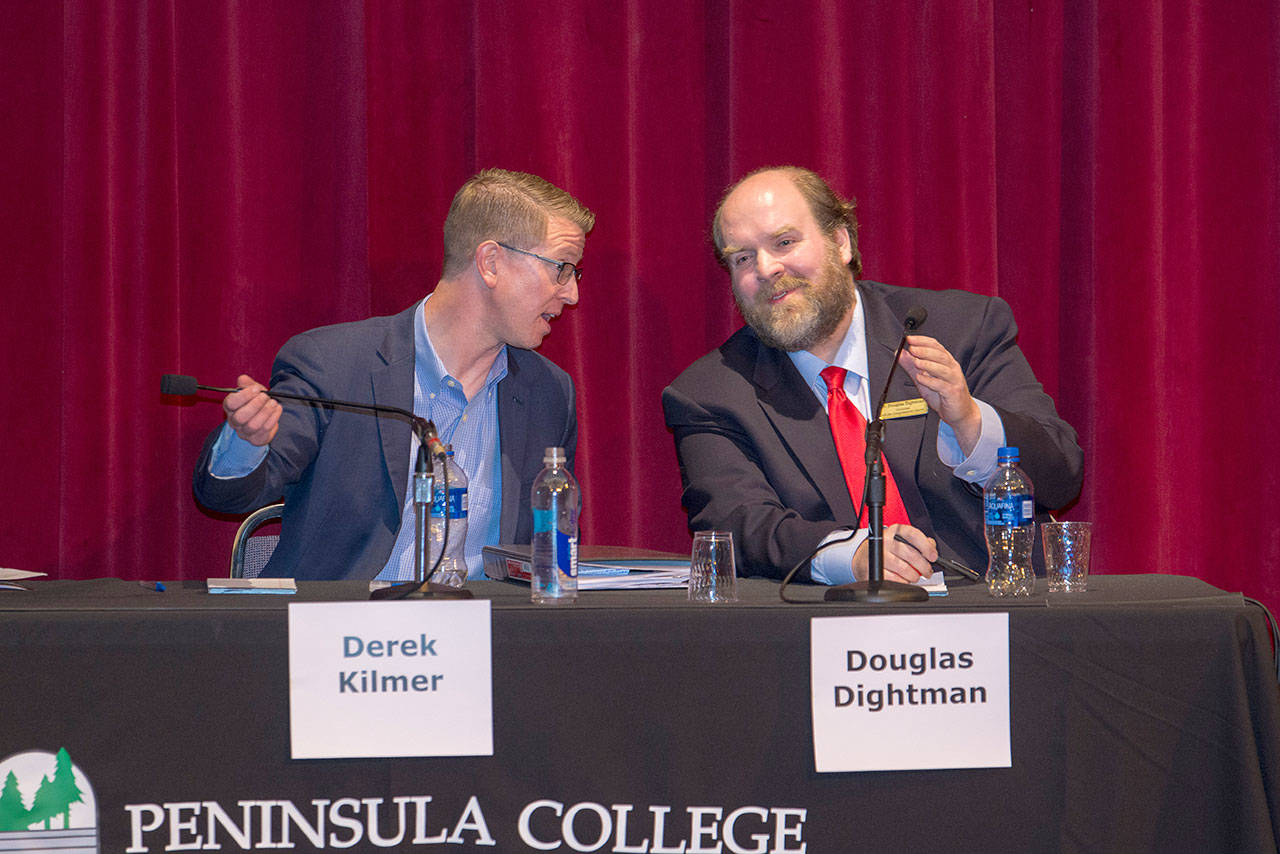PORT ANGELES — Dr. Douglas Dightman, a Republican seeking to unseat U.S. Rep. Derek Kilmer, suggested Olympic National Park be removed from the national park system and transferred to the state.
Dightman said this during a League of Women Voters forum at Peninsula College on Wednesday.
“One of the things I might consider … is that the entire Olympic Park actually resides within the state of Washington,” Dightman, a family medicine practitioner, said.
“I’m not sure why we can’t just give the park to the state of Washington and let them manage it, let the people who live around it have more control with what goes on in the park … and have more control at the local level.”
The 922,650-acre Olympic National Park has a $120 million maintenance backlog and has an annual operating budget of about $12 million.
Dightman of Shelton is vying against the Gig Harbor Democrat in the Nov. 6 general election for Kilmer’s position representing Washington’s 6th Congressional District. The district covers the Olympic Peninsula, most of the Kitsap Peninsula and most of the city of Tacoma.
The park is slightly more than 20 percent of the area of the 6th Congressional District.
Kilmer, a Port Angeles native who has represented the district since 2013, responded by saying he sees value in having a national park system.
“In part, it means that we have a stewardship ethic nationwide for our national parks, but in part it means those maintenance obligations … that cost is not entirely born by the taxpayers of Washington State,” Kilmer said.
“It is a good thing that as a nation we collectively say these are public assets that we want to maintain and that that cost is not entirely borne by the residents of the Olympic Peninsula.”
Dightman said their views on Olympic National Park show a “fundamental difference” between the two candidates.
Throughout the forum Dightman suggested the federal government should take a step back from what he sees are local issues, such maintenance of Olympic National Park.
“I don’t think the federal government has a role in deciding what we’re doing with things that are entirely within our state,” Dightman said.
“We’re sending so much money to Washington, D.C., where the importance of the issues is getting lost because the issues are getting further away from where they are important.”
While Dightman and Kilmer both agreed that Congress is dysfunctional at best, Kilmer frequently pointed to his work to encourage bipartisanship.
Kilmer co-sponsored the Restore Our Parks and Public Lands Act in July, a bipartisan bill Kilmer said he is optimistic could pass before the end of the year.
It would use half of the federal government’s income from energy production on federal lands and offshore to address the $12 billion National Park Service maintenance backlog.
“I actually think that bill will likely pass before the year is out and that is good news for us out here on the Olympic Peninsula,” Kilmer said.
“Our park is an amazing generator of economic opportunity in this region. It is the crown jewel, but the crown jewel is getting a little rusty.”
He said the bill would make a “significant dent,” in the maintenance backlog.
Climate change
Dightman and Kilmer also had differing opinions on whether humans contribute to climate change. A Peninsula College student asked the candidates whether they would support legislation that would bring the United States back in line with the Paris Agreement or at least support U.S. specific science-based legislation that would limit emissions of greenhouse gases.
“What I’m going to support is further research in the area of climate change,” Dightman said. “I don’t think we definitively know whether man is causing all the changes or not. I know we hear from the media that 97 percent of climatologists think that man is making the change, but the reality is that isn’t an accurate statistic.”
According to the National Aeronautics and Space Administration, multiple published studies show that 97 percent or more of actively publishing climate scientists agree that climate-warming trends over the past century are “extremely likely due to human activities.”
Dightman said that if climate change is real, it’s a “big, big deal and we need to do something about it.”
Dightman said he believes the Paris Agreement is meant to make a difference in the world, but that the U.S. needs to be responsible for itself.
“We don’t need every other country in the world telling us what we should do,” Dightman said.
The Peninsula College student responded while asking a second question, saying he is quizzed on the topic in class and that textbooks used at the college reference that research.
When the student said he’d show Dightman the textbook, Dightman responded and said “that’s just a silly thing to say,” and that he could show 100 textbooks that offer a differing view.
Kilmer was clear in his response.
“I think climate change is real; I think human beings contribute to it; I think it’s time for politicians to stop kowtowing to the fossil fuels industry and step up and do something about it,” Kilmer said.
“I think it’s embarrassing the United States is the only country on the planet that is not part of the Paris Climate Agreement,” Kilmer said. “I think that we should be a part of it.”
President Donald Trump announced in June 2017 that the U.S. would withdraw from the climate pact. Withdrawal takes three years.
________
Reporter Jesse Major can be reached at 360-452-2345, ext. 56250, or at jmajor@peninsuladailynews.com.
